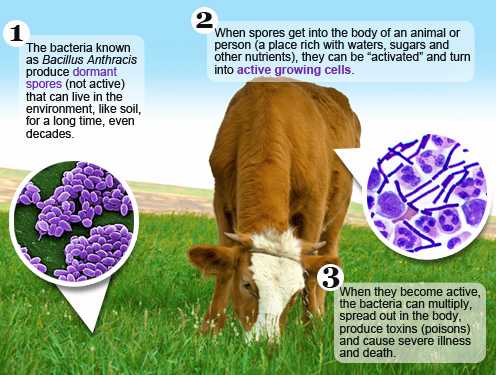Anthrax

What is anthrax?
Anthrax is a serious disease caused by a one-celled bacterial organism known as Bacillus anthracis. This bacterium forms spores, a resistant form that lies dormant until the right conditions exist for them to germinate and produce vegetative cells.
How is anthrax spread?
There is no evidence that anthrax spreads from one person to another. Instead, it is most commonly spread when humans handle products from infected animals, breathe in anthrax spores from infected animal products, or eat undercooked meat from infected animals. In recent years, anthrax has also been used as a destructive weapon, when in 2001, a powder containing anthrax spores was sent to targeted individuals through the U.S. Postal System.
What should a breastfeeding woman do if she has been exposed to anthrax?
For a breastfeeding mother who has been exposed to Bacillus anthracis spores, she and her child’s health care provider will need to consider the effectiveness of recommended medications for the prophylaxis or treatment of anthrax, the safety of the medications for the infant, as well as the benefits of breastfeeding to both mother and child.
If the strain of anthrax is susceptible to penicillin, physicians may prescribe amoxicillin if no other contraindications to the mother are present. Amoxicillin is among those drugs categorized as safe for use with infants. The American Academy of Pediatrics also considers ciprofloxacin and tetracyclines (which include doxycycline) to be compatible with breastfeeding because infants absorb only a small amount of either drug. However, little is known about the safety of long-term use of these medications.
Reference
CDC. Morbidity and Mortality Weekly Report (MMWR) November 16, 2001, 50(45):1014–1016.
For more information on Anthrax, visit CDC’s Emergency Preparedness and Response, or call the CDC public response hotline at (888) 246-2675 in English; (888) 246-2857 en Español or (866) 874-2646 (TTY).
- Page last reviewed: October 20, 2009
- Page last updated: May 15, 2017
- Content source:


 ShareCompartir
ShareCompartir